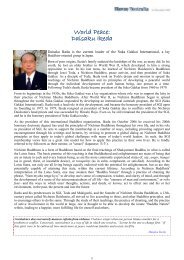Issue 8.5 - Bharatiya Vidya Bhavan Australia
Issue 8.5 - Bharatiya Vidya Bhavan Australia
Issue 8.5 - Bharatiya Vidya Bhavan Australia
You also want an ePaper? Increase the reach of your titles
YUMPU automatically turns print PDFs into web optimized ePapers that Google loves.
New Delhi: Barack Obama, the sixth American<br />
President to visit India since it gained independence,<br />
arrives at a trying time, both for the United States<br />
and for India. Some of Obama’s closest advisers<br />
have just resigned, opening an awkward gap on<br />
national security and the economy—the focus of his<br />
meetings with India’s government.<br />
For India, the issues on the agenda for Obama’s<br />
visit are immense and complex, and the options for<br />
resolving them are extremely limited. Those related<br />
to security in Afghanistan and Pakistan are as<br />
treacherous as they have ever been. Bilateral<br />
economic, trade, and currency disagreements may<br />
not be as bitter as they are between the US and<br />
China, but they are thorny, and lack of resolution is<br />
making them more intractable.<br />
Nuclear non-proliferation remains one of Obama’s<br />
priorities, as does the sale of US civilian nuclear<br />
technology to India, for which former President<br />
George W. Bush cleared the way. And Obama will be<br />
keen to know what help India can provide with Iran, a<br />
country with which India has smooth relations, owing<br />
to their shared worries over Afghanistan and Pakistan.<br />
Given this potent list of challenges, what are the<br />
prospects for Obama’s passage to India? Some<br />
years ago, I was queried by then US Deputy<br />
Secretary of State Strobe Talbott, who was helping<br />
to prepare President Bill Clinton’s visit. As India’s<br />
Foreign Minister at the time, I told him: “Why make<br />
the visit destinational? Be content with the<br />
directional,” or some such words. That response<br />
retains its flavor today: as new directions in India-<br />
US relations are set, new destinations will follow.<br />
All state visits are overloaded with lofty,<br />
superfluous rhetoric. US-India summits are<br />
46 | <strong>Bhavan</strong> <strong>Australia</strong> | Nov 2010<br />
The New<br />
Power Game<br />
Obama in India<br />
particularly prone to this hubris: the Great<br />
Republic meets the World’s Largest Democracy. It<br />
would be better for both countries to shed some of<br />
these marigold garlands of cloying adjectives.<br />
Another feature of such summits—the trading of<br />
lists of “must do” and “can do” items—also should<br />
be retired. It is both demeaning and tedious to treat<br />
an arriving US president as a stars-and-stripes<br />
Santa Claus, to be presented with lengthy wish<br />
lists. Likewise, despite America’s pinched<br />
economic circumstances, Obama would do well not<br />
to use his visit to peddle US wares. Although trade<br />
is an effective lubricant of good relations, these<br />
sorts of talks are for the “sherpas,” not Obama and<br />
Prime Minister Manmohan Singh, to handle.<br />
These two great countries, “natural allies” in the<br />
words of former Prime Minister Atal Bihari Vajpayee,<br />
should reflect on what they have accomplished<br />
together since 1998, in order to map what lies ahead.<br />
Theirs is now a relationship of equals, so their<br />
national interests need to be reconciled on<br />
everything from Pakistan to climate change.<br />
Indeed, Obama is placed in a unique position for an<br />
American president, a position that he appears to<br />
comprehend, though his opponents in the US do<br />
not. Power today begins in the acceptance of the<br />
limits upon it. This is also true of an India that is<br />
only now coming to recognize its new status in the<br />
world, in which the country’s limits and<br />
responsibilities have expanded mightily.<br />
Ours is an unstable neighborhood, one that<br />
America has entered without fully understanding<br />
the consequences—for India and for the<br />
neighborhood. India must ask Obama hard<br />
questions about how security is to be assured,









